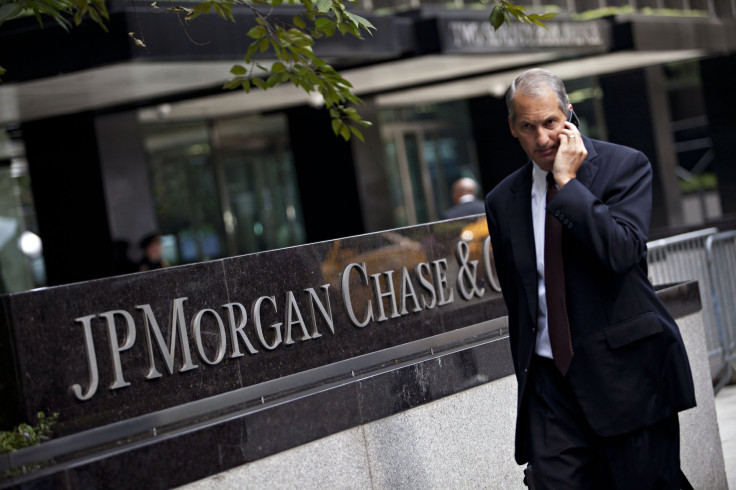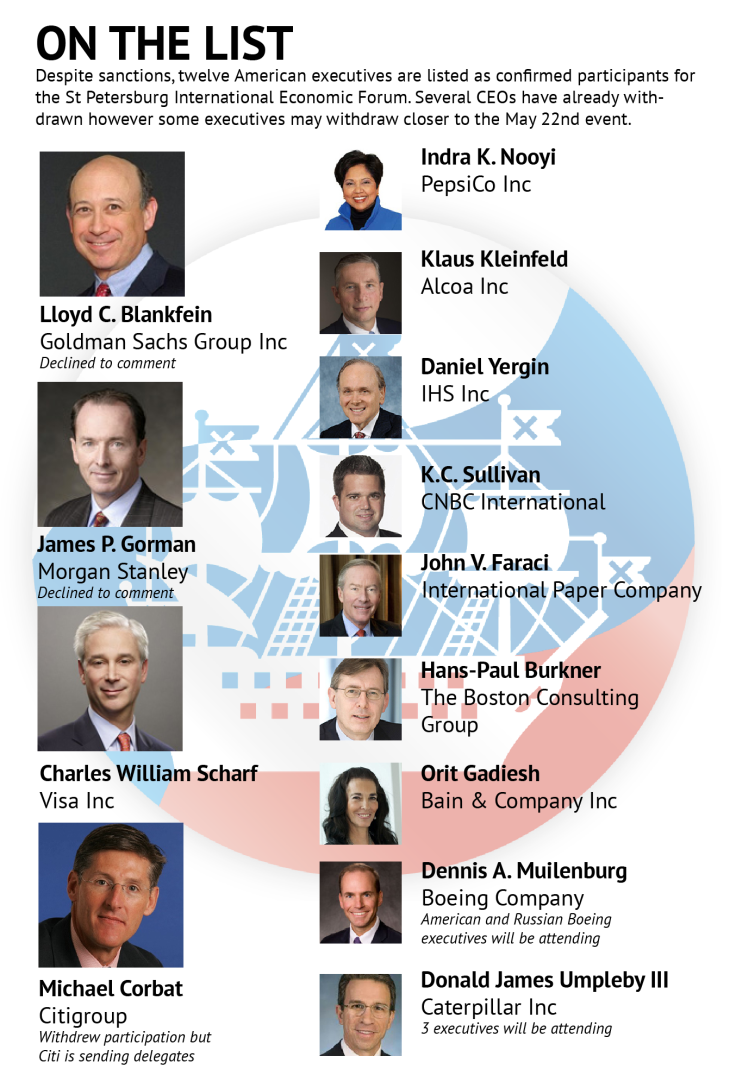Wall Street's Top Banks To Keep Lower Profile At Russian Investment Meeting Amid Growing Sanctions

Wall Street's top firms are walking an increasingly fine line between business as usual and growing political pressure to shun Russia for its annexation of Crimea and meddling in Ukraine, believing that their business ties are more important than political sanctions, at least for now.
Morgan Stanley, Goldman Sachs and Citigroup are sending representatives to a high-level economic forum in St. Petersburg next month to talk business and make deals with their Russian counterparts. While some banks have decided to tone down the meeting's more junior staff instead top executives, they say they still need to attend as they have sizeable stakes in Russian firms.
Experts say it’s nothing personal, just business.
“On the one hand, there’s pressure from the American government on companies based in the U.S., but at the end of the day fiduciary responsibility probably trumps political correctness at this time,” said John Branch, professor and associate at the Center for Russian, East European and Eurasian Studies at the Ross School of Business at the University of Michigan.
“This is just naturally part of the global economy and companies are out there investing all over the world, sometimes in places which are slightly dodgy. One could argue that [a company] needs to be there simply because it does have investments in the region, and therefore it needs to know what’s happening on the ground,” Branch said.
The St. Petersburg International Economic Forum runs from May 22-24, and will bring together business leaders and executives from around the world to make deals, talk strategy and mingle.

Last year, more than 6,000 delegates from 81 countries inked more than 100 deals worth about $300 billion, according to the event’s website. Though the conference was first held in 1997, it’s been “under the auspices of Vladimir Putin, President of the Russian Federation,” since 2006.
This year’s gathering takes place amid a flurry of economic sanctions from the Obama administration, which targeted 17 new companies on Monday in an attempt to persuade Putin to back away from Ukraine.
“From the very outset of Russia’s illegitimate and unlawful actions in Ukraine, we have been clear: The United States, acting on its own and alongside our international partners, will impose increasing costs on Russia if it persists in its efforts to destabilize Ukraine and will hold Russia accountable for its provocative actions,” Undersecretary for Terrorism and Financial Intelligence David S. Cohen, said Monday in a public statement.
This won't be the first time business negotiates tricky political circumstances. American firms kept operating in South America in the volatile 1970s and in Arab countries more recently during the Arab Spring.
“Business is quite independent from politics,” said Sergei Millian, president of the Russian-American Chamber of Commerce, adding that businessmen should be able to make their own decisions.
“They have to observe the laws of their land, but they can make their own decisions of what to do, what will be good for business. If they feel they should work with Russia, they can.”
Morgan Stanley (NYSE:MS) has had a presence in Russia since 1994, and also stayed during the 1998 economic crisis. It opened a Russian subsidiary in 2005. Euromoney named that bank the Russia's “Best M&A House” in 2011.
But on Tuesday the bank said the planned sale of an oil business it owns to Rosneft will likely be stalled until tensions cool, according to Bloomberg. Rosneft’s CEO is Igor Sechin, is one of the latest Russians targeted with sanctions by the Obama administration.
The conference website still lists James Gorman, CEO and board chairman for Morgan Stanley as also attending. The banks corporate communications representative declined to comment on or confirm this.
Citigroup Inc. (NYSE: C) has been in Russia for almost a century. Though it ceased operations from 1920 to 1970 it resumed business briefly in 1974, when it opened a branch on Moscow's Karl Marx Avenue. But it wasn’t until 1993 that Citi opened for business permanently, launching its retail arm four years later. By 2010, they were serving more than a million Russian clients.
Citigroup is listed as an “International Partner” on the event's website but it said it won’t be sending its top executive. "While our CEO is not able to attend this year, Citi will have several representatives at the forum,” wrote their representative Mark Costiglio, in an email to IBTimes.
Goldman Sachs, which has been working in Russia since 1998, may be taking a similar route. Though CEO Lloyd Blankfein is also slated to attend, he and other executives are likely to pass the duty on to junior associates, according to the Financial Times.
Despite the political stigma, it’s still necessary that executives keep operating in the country.
“From an investing standpoint, investors care about the bottom line, “said Adam Sarhan, founder and CEO of Sarhan Capital investment and advisory firm. He explained that having the banks fully withdraw from such a large market would be more damaging than the political stigma of attending. He added that while Russia has angered the international community it still hasn't entered all-out war, yet.
Sath Rao, vice president of consulting firm Frost & Sullivan said that it’s important American banks keep operating and that business connections may even help keep the situation stable.
“Big financial firms have several interests in Russia and are also onboard with the international response; it is part of business risks and there is nothing wrong with the big banks joining the St. Petersburg International Economic Forum, “said
He said sanctions or no sanctions, keeping communication channels open is an important aspect of breaking the logjam.
© Copyright IBTimes 2025. All rights reserved.






















